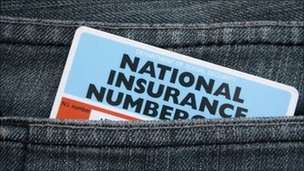
1. TASK: Insert the appropriate word in the text below:
depends - earning - qualify - reach
gaps - profit - treated - contributions
You pay National Insurance contributions to ________ for certain benefits including the State Pension.
You pay National Insurance if you’re:
- 16 or over
- an employee ________ above £155 a week
- self-employed and making a ________ of £5,965 or more a year
You need a National Insurance number before you can start paying National Insurance ________.
If you earn between £112 and £155 a week, your contributions are ________ as having been paid to protect your National Insurance record.
National Insurance classes
There are different types of National Insurance (known as ‘classes’). The type you pay ________ on your employment status and how much you earn, and whether you have any ________ in your National Insurance record.
When you stop paying
If you’re employed, you stop paying Class 1 National Insurance when you ________ the State Pension age.
If you’re self-employed you stop paying:
- Class 2 National Insurance when you reach State Pension age
- Class 4 National Insurance from 6 April (start of the tax year) after you reach State Pension age.
2. CHECK YOUR SPEAKING
|
qualify |
[ ˈkwɒlɪfaɪ ] |
підходити |
|
contributions |
[ ˌkɒn.trɪˈbjuː.ʃən ] |
внесок |
|
depends |
[ dɪˈpend ] |
залежати |
|
earning |
[ ɜːn ] |
дохід |
|
gaps |
[ ɡæp ] |
прогалина |
|
profit |
[ ˈprɒfɪt ] |
прибуток |
|
reach |
[ riːtʃ ] |
досягти |
|
treated |
[ triːt ] |
трактувати |
3. SEE CORRECT ANSWER
You pay National Insurance contributions to qualify for certain benefits including the State Pension.
You pay National Insurance if you’re:
- 16 or over
- an employee earning above £155 a week
- self-employed and making a profit of £5,965 or more a year
You need a National Insurance number before you can start paying National Insurance contributions.
If you earn between £112 and £155 a week, your contributions are treated as having been paid to protect your National Insurance record.
National Insurance classes
There are different types of National Insurance (known as ‘classes’). The type you pay depends on your employment status and how much you earn, and whether you have any gaps in your National Insurance record.
When you stop paying
If you’re employed, you stop paying Class 1 National Insurance when you reach the State Pension age.
If you’re self-employed you stop paying:
- Class 2 National Insurance when you reach State Pension age
- Class 4 National Insurance from 6 April (start of the tax year) after you reach State Pension age.
 Цей та багато інших цікавих матеріалів Ви знайдете
Цей та багато інших цікавих матеріалів Ви знайдете
в підручнику “Practical Financial English”
Докладніше про книгу та її замовлення див. тут >>>
Переглянути нову термінологію і пройти інші тести можна тут >>>
Тренуйте навички фінансової англійської тут >>>